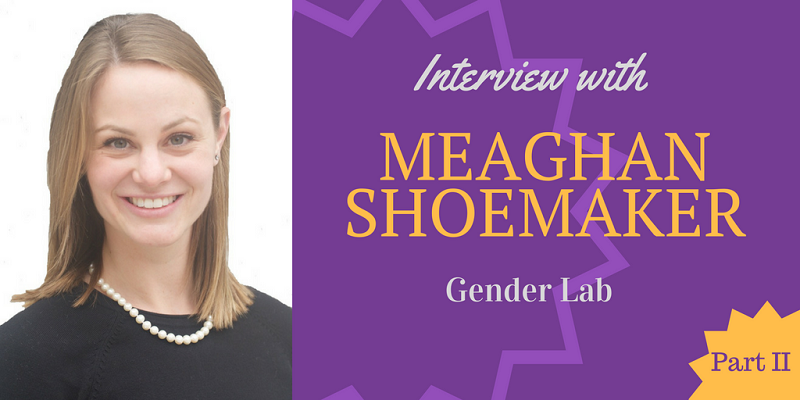On part I, Meaghan discussed a specific research project, in Part II, she discusses her work at Women In International Security-Canada (WIIS-Canada) and touches on gender issues in her graduate studies.
Read part I here.
Mégane: Here at NAOC, we are working hard towards bringing gender perspective through our program, what are your view on gender representation, equality, awareness in the field of security. Particularly the military?
Meaghan: I believe there’s a unique component that women can bring to military operations and peace support. Particularly with the federal commitment to peacekeeping, there is a unique role that women in the military can play. There are also strategic advantages during operations that we saw with the Female Engagement Teams.
Thus far, with regards to representation, there’s been development at the international and national policy level to support gender representation and equality in the Canadian Armed Forces.
That being said, there’s still a lot of work to be done. The reports [Deschamps, StatsCan] speak for themselves when we are looking at equality, representation, and awareness.
Additionally, when considering gender representation, we need to look at recruitment and retention processes for the military. With CDS Vance’s commitment to a one percent increase until the Employment Equity goals are met, there needs to be attention given to how the CAF recruits, what processes and programs are in place to ensure professional development, and how we can put political goals into practice.
You organized a conference highlighting the need to implement gender balancing and mainstreaming initiatives under the banner of the Women, Peace, and Security agenda. How are we doing thus far with the implementation of UNSCR 1325?
With regards to participation in the military, there are efforts towards inclusion at the policy level. For that, I think we are doing well. But the CAF has stagnated in terms of female recruitment and representation. CDS Vance’s goal shows a commitment to increasing this, but in practical terms we will see how that plays out in the coming years. This participation goal must also be met with transition strategies for veterans, however, and that is what our project hopes to address.
With regards to prevention of sexual violence in the military, as I had mentioned, the reports speak to the challenges the CAF currently face. In my own research, CAF sexual assault policies did not directly reference UNSCR 1325. In particular, neither Operation Honour (2015) which sought to eliminate harmful and inappropriate sexual behaviour within the CAF, nor the External Review into Sexual Misconduct and Sexual Harassment in the Canadian Armed Forces refer to UNSCR 1325.
I think an important question to ask is why these challenges persist. Reports highlight an important element of “what is happening,” and we need to consider the “why.” The Deschamps report highlighted sexualized culture. In my research I’m exploring if there are additional factors that would impede the “participation” and “prevention” pillars of UNSCR 1325 with regards to the CAF.
What is it like to be a woman researcher in a field of security study (military) that tends to be male-dominated?
It has been a learning process. Professionally, sometimes there are challenges with regards to people questioning your credibility because you sound “young” on the phone during interviews, or have a higher voice. During one of the first phone discussions I held, this was the case and as a researcher I was completely discounted.
That being said, I am very fortunate to have the support of the Department of Political Studies at Queen’s. We have some amazing mentors here as part of our faculty, and I learned so much from my cohort. In the department I do not feel I face the same challenges due to being a woman studying security and the military.
I’ve also started working with Women in International Security Canada, which was started by my supervisor Dr. von Hlatky. By being involved with this organization I am now part of a network of women across Canada who are studying security (broadly defined). The guidance and mentorship that is embedded in WIIS-Canada is so unique. As a member, I have received insights on things such as time management, presentation skills, family obligations and academia as a profession.
What advice would you give to young people aiming to pursue graduate studies?
As a graduate student, it is easy to feel isolated. There are large amounts of time that are spent independently; doing coursework, research, writing. But the process and experience is really what you want to make it. Are there research labs you can get involved with? Clubs you can join (or start)? Collaborations you can make?
Grad school is a great opportunity to enhance and develop professional skills. I would say an emphasis on skill development is important. Over time, knowledge and information changes, as do “hot topics” for research, but the skills you develop are translatable to many different occupations (and fields).
Finally, I would promote making connections within your own cohort. Over the last two years at Queen’s, some of my greatest learning moments have occurred during candid discussions with my office mate.
Can you tell me a bit more about your role at WIIS-Canada, and how it is impacting your research?
I am the Program Assistant for WIIS-Canada. It’s funny, I had zero web design skills when I started working with WIIS-Canada. Over the last eight months, I have developed this skill and now update and make changes to the website and news feed. I also help with membership and outreach, along with our amazing Board of Directors. The WIIS-Canada board, working closely with members, is a great team.
The annual workshop in June 2016 provided huge development for my research. The networking opportunities allowed me to connect with other researchers in my field, as well as provided a space for comments and areas of improvement of my research. I have kept in touch with quite a few participants from the workshop and look forward to working with them in the coming years.
How did you get interested in gender studies, combined with security/military?
My initial interest was sparked during my time at Guelph in my conflict and conflict resolution course. One week we focused on gender, and how different theories operationalize (or don’t operationalize) gender as influencing peace and conflict. Questions like “are women inherently more peaceful than men?” and “Does gender matter?” sparked debate during lectures that sucked me right in. I appreciate our professor at the time, Dr. Ian Spears, for allowing the debate to continue for almost an entire class!
After this I knew I wanted to continue learning. I had started looking at graduate programs and schools, and almost immediately found Dr. von Hlatky’s profile on the Queen’s website. After discussing our research interests, it seemed like a great fit. I applied to Queen’s and the rest is history!
What is next?
Right now, I am just finishing up my first semester of course work for my PhD. In 2017, I’ll be presenting a co-authored paper, developed in our Gender Lab at the International Studies Association Annual Conference in Baltimore. Through the Centre for International and Defence Policy, I’ll also continue working on the implementation of the Summer internship program, the Veteran Service Provider Internship.
Longer term, I’d like to stay in academia. The opportunity to produce high-quality research while maintaining active involvement in policy-driven advocacy work keeps things busy and interesting. I’m excited for what the next three years hold.
We wanted to thank Meaghan again for such a horizon-widening interview.
Check out the Gender Lab of Queens University CIDP here, to learn more about Meaghan’s research projects, and the Women in International Security-Canada (WIIS-Canada) website here.
Disclaimer: Any views or opinions expressed in articles are solely those of the authors and do not necessarily represent the views of the NATO Association of Canada.



